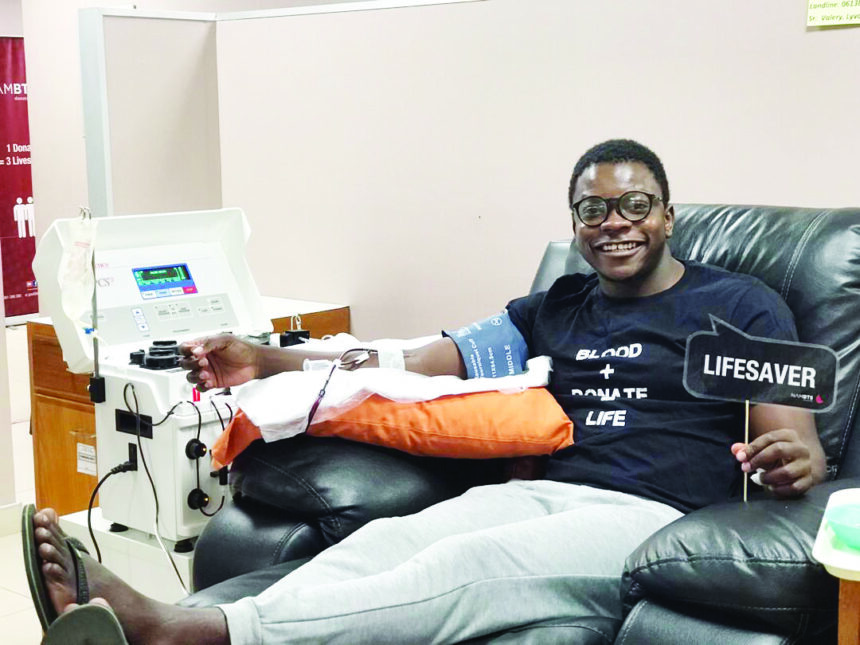Namibians who depend on blood transfusions to survive are grateful to the people who consistently donate blood so that they can have a chance at life.
Camilla Mbaendavi (19) has been suffering from aplastic anaemia for two years, a severe hematologic condition in which the body fails to make blood cells in sufficient numbers, meaning she is in constant need of blood donations.
The Namibia Blood Transfusion Services (NamBTS) revealed to New Era that for the first quarter of the year (January to May 2024), they had a total of 20 527 blood donations made at numerous venues across the country.
“I am very grateful for all donors who have donated blood. Believe me when I say I am here today because of that noble deed from them. I require transfusions, depending on how often I bleed; hence, people need to donate blood as many Namibians need transfusion,” said the stay-at-home teen.
Aplastic anaemia is a condition that occurs when the body stops producing enough new blood cells. The condition leaves the patient fatigued, and more prone to infections and uncontrolled bleeding. A rare and serious condition, aplastic anaemia can develop at any age. It can occur suddenly, or it can come gradually and worsen over time. It can be mild or severe.
Treatment for aplastic anaemia might include medications, blood transfusions or a stem cell transplant, also known as a bone marrow transplant.
The spokesperson of NamBTS Titus Shivute, said this is a steady increase in donations in comparison to last year, when 18 541 whole blood donations were made over the same period.
“The demand for blood and blood products is ever-increasing, and NAMBTS needs to collect at least 4 000 units of blood a month (from 4 000 people) to meet the demand for hospitals and medical centres in Namibia,” said Shivute.
He said most donations are happening in the Khomas region because NamBTS has more than one fixed centre in Windhoek, and hosts significantly more mobile blood donation clinics at schools, tertiary institutions, corporate, retail, and industrial entities compared to other regions in the country.
“In Namibia, only 1.2% of our population donates blood on an annual basis, and we need to raise awareness that blood donation is an altruistic action that benefits society and that supply can only be ensured through regular donations by voluntary, unpaid blood donors, especially our youth,” said Shivute.
Blood donations in Namibia are mostly needed for women with complications of pregnancy, such as ectopic pregnancies and haemorrhage before, during, or after childbirth; children with severe anaemia often resulting from malaria or malnutrition; people with severe trauma following man-made and natural disasters; and many complex medical and surgical procedures and cancer patients.
“It is also needed for regular transfusions for people with conditions such as thalassemia and sickle cell disease and is used to make products such as clotting factors for people with haemophilia,” he said.
He encouraged Namibians to donate blood, and be wary of myths around the donation of blood.
“Myths surrounding blood donation as a concept: a lot of people believe that they donate blood for free, and must pay for it when they need a transfusion. Blood donors typically give blood voluntarily without any payment. However, hospitals and clinics may charge for the blood when it is transfused to a patient. This charge is not for the blood itself, but for the costs associated with collecting, testing, processing, storing, and transporting the blood,” said Shivute.
NamBTS needs donors to donate blood more frequently to consistently have an adequate supply of blood for patients. Donors are eligible to donate every 56 days (roughly two months), meaning you can donate up to six times in a calendar year. NamBTS has observed that the average donor donates blood less than twice a year, and urges more donors to donate regularly, at least four times a year.
Lance Kampungu (26) has donated blood 58 times to date and pledges to continue doing so, saying: “God reminded me that I have blood running through my veins, and I should start with what I already have. I continue donating blood because I am constantly reminded about where it all started.”
He said: “The answers to the problems we have are in what we have, not in what we need to acquire. It starts with as little as donating blood to your fellow Namibians. You too can make a difference, one donation at a time.”


